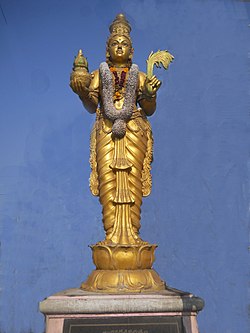Telugu Thalli: Difference between revisions
No edit summary |
No edit summary |
||
| (One intermediate revision by one other user not shown) | |||
| Line 1: | Line 1: | ||
{{ | {{More citations needed|date=August 2013}} | ||
[[File:Telugu talli bomma.JPG|thumb|తెలుగు తల్లి - Telugu Thalli]] | [[File:Telugu talli bomma.JPG|thumb|తెలుగు తల్లి - Telugu Thalli]] | ||
'''Telugu Thalli''' ([[IAST]]:''Teluɡu Talli''; {{literally|Mother [[Telugu language|Telugu]]}}) is the female [[personification]] of [[Telugu people]] and [[ | '''Telugu Thalli''' ([[IAST]]: ''Teluɡu Talli''; {{literally|Mother [[Telugu language|Telugu]]}}) is the female [[personification]] of [[Telugu people]] and [[Telugu people#Culture|their culture]]. | ||
She holds the harvest in her left hand portraying that the Telugu land is always filled with greenery (prosperity and happiness). In the right hand she holds the kalasam which signifies that she brings all good to the people's lives. The goddess is dressed in the traditional Telugu style. Since language is considered | She holds the harvest in her left hand portraying that the Telugu land is always filled with greenery (prosperity and happiness). In the right hand she holds the kalasam which signifies that she brings all good to the people's lives. The goddess is dressed in the traditional Telugu style. Since language is considered one of the most necessary skills to the mankind and our Telugu Thalli has provided us with that, she is given utmost priority in our lives. | ||
[[Maa Telugu Thalliki]] (Telugu: మా తెలుగు తల్లికి) is the official song of the state [[Andhra Pradesh]], [[India]]. It was written by [[Sankarambadi Sundaraachari]] for the Telugu film ''Deena Bandhu'' (1942) which starred [[Chittor V. Nagaiah]]. The song gained popularity and was ultimately made the official song of Andhra Pradesh. | [[Maa Telugu Thalliki]] (Telugu: మా తెలుగు తల్లికి) is the official song of the state [[Andhra Pradesh]], [[India]]. It was written by [[Sankarambadi Sundaraachari]] for the Telugu film ''Deena Bandhu'' (1942) which starred [[Chittor V. Nagaiah]]. The song gained popularity and was ultimately made the official song of Andhra Pradesh. | ||
| Line 91: | Line 91: | ||
== Popular culture == | == Popular culture == | ||
[[File:Telugutalli flyover.jpg|thumbnail|[[Telugu Thalli Flyover]] in [[Visakhapatnam]]]] | [[File:Telugutalli flyover.jpg|thumbnail|[[Telugu Thalli Flyover]] in [[Visakhapatnam]]]] | ||
A remix of the original song was used in the 2010 film ''[[Leader (2010 film)|Leader]]'', composed by [[Mickey J. Meyer]].<ref>http://www.indiaglitz.com/channels/telugu/musicreview/11769.html</ref> | A remix of the original song was used in the 2010 film ''[[Leader (2010 film)|Leader]]'', composed by [[Mickey J. Meyer]].<ref>{{cite web| url = http://www.indiaglitz.com/channels/telugu/musicreview/11769.html| title = Telugu Cinema News {{!}} Telugu Movie Reviews {{!}} Telugu Movie Trailers - IndiaGlitz Telugu}} </ref> | ||
==See also== | ==See also== | ||
Latest revision as of 08:02, 20 June 2022
This article needs additional citations for verification. (August 2013) |
Telugu Thalli (IAST: Teluɡu Talli; lit. 'Mother Telugu') is the female personification of Telugu people and their culture.
She holds the harvest in her left hand portraying that the Telugu land is always filled with greenery (prosperity and happiness). In the right hand she holds the kalasam which signifies that she brings all good to the people's lives. The goddess is dressed in the traditional Telugu style. Since language is considered one of the most necessary skills to the mankind and our Telugu Thalli has provided us with that, she is given utmost priority in our lives.
Maa Telugu Thalliki (Telugu: మా తెలుగు తల్లికి) is the official song of the state Andhra Pradesh, India. It was written by Sankarambadi Sundaraachari for the Telugu film Deena Bandhu (1942) which starred Chittor V. Nagaiah. The song gained popularity and was ultimately made the official song of Andhra Pradesh.
Maa Telugu Thalliki is a composition in which the greatness of Telugu culture is depicted. For the various versions on the etymology of Telugu, see Telugu language. The image of the mother is used as a metaphor for all the prosperity and culture of the region. She is the one who has bestowed us with fertile lands; she is the one whose compassion protects the people; she is the one whose praise is sung time and time again. She is the embodiment of various aspects of cultural legacy like the beautiful architecture of Amaravati; the classical music immortalised by Tyagaraja; the lyrical beauties of Tikkana, who rendered the Mahabharata into Telugu; the physical bravery of Rani Rudrama Devi of the 13th century Kakatiya dynasty; the 'devotion to husband' of Mallamma; the sharp intelligence of Timmarusu, who was the Prime Minister of Krishna Deva Raya; or the fame of Krishna Deva Raya. She is our mother, and will forever reside in our hearts. It may be seen that while invoking the cultural legacy of the Telugus, the song covers all the three important regions: Rayalaseema, Coastal Andhra and Telangana.
Original song lyrics[edit]
| తెలుగు తల్లి (in Telugu) | Telugu talli (In Latin Transcript) | Mother Telugu (In English) |
|---|---|---|
|
మా తెలుగు తల్లికి మల్లెపూదండ |
Mā telugu talliki mallepūdaṇḍa |
A garland of Jasmines for our Mother Telugu, |
Popular culture[edit]
A remix of the original song was used in the 2010 film Leader, composed by Mickey J. Meyer.[1]

